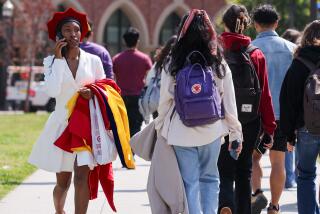Curran Abandons Effort to Teach Classes
- Share via
WASHINGTON — Father Charles Curran, the maverick theologian whose license to teach at Catholic University was revoked by the Vatican, Thursday abandoned his efforts to teach classes after school officials threatened to invoke a church law that Curran said could undermine academic freedom at Catholic schools across the nation.
“The story today is (that) Curran blinked,” he said at a campus news conference packed with student and faculty supporters. “As important as my right to teach is . . . I do not want to bring about the fall of Catholic education in the United States.”
Curran, who has clashed with the Vatican for more than a decade over his relatively liberal views on sexual ethics, vowed to continue his fight for reinstatement, possibly in a civil suit.
Archbishop Intervenes
The 52-year-old tenured professor was to begin teaching courses Thursday in ethics and moral philosophy. However, Archbishop James A. Hickey, who is also the university’s chancellor, suspended him last Friday, citing an earlier Vatican decision that Curran’s liberal views on abortion, homosexuality and contraception make him unfit to teach at the school.
Church officials were empowered to revoke Curran’s license because Catholic University is the only school in the United States chartered by the Vatican. The school’s by-laws require that all faculty members receive a special teaching authorization from the church.
Curran intended to challenge that decision this week, contending that the university did not have the power to bar him from teaching non-ecclesiastical students. But he backed off when Hickey sent him a letter canceling the classes and threatening to block any further protest under a controversial church law known as Canon 812.
The law, which has never been invoked in the United States, says that it is “necessary that those who teach theological disciplines in any institute of higher studies have a mandate from the competent ecclesiastical authority.”
Wide Implications
In a nutshell, Curran said, the doctrine means that church authorities could choose to intervene in faculty matters in all Catholic schools across the nation, such as Notre Dame and Georgetown universities. Those schools have Catholic faculty and leadership but, unlike Catholic University here, are governed independently and faculty members are not required to have Vatican charters.
If the canon were to be invoked, Curran continued, it could open the floodgates for similar faculty moves at any Catholic university. Church authorities would have “new and damaging power. . . . A terrible precedent would be set. It could be catastrophic for academic freedom.”
Hickey’s threat to utilize Canon 812 was “reckless and irresponsible,” Curran said, adding that he might pursue a legal challenge of the suspension, but “hopefully not to risk a confrontation” over the statute.
Ann Smith, a spokeswoman for Catholic University, said Thursday that Hickey and other school officials had no comment on Curran’s case, which is currently being reviewed by an academic committee.
Strong Reactions
However, other Catholic academicians and other educators reacted strongly to the latest development in a case that has pitted the Vatican and its conservative hierarchy against a battery of critics.
“I don’t see that (Canon 812) really changes the situation at all, because the Vatican has said that Curran, because of his dissent, cannot be regarded as a Catholic theologian,” said Germain Grisez, professor of Christian ethics at Mt. St. Mary’s College in Emmitsburg, Md.
Grisez added that “what is objectionable (about Curran) is that . . . having taken a position contrary to teachings of the church, he’s giving pastoral advice. He’s telling people it’s all right to think these things and setting himself up as a counterpart to the Pope.”
Father Richard P. McBrien, head of the theology department at the University of Notre Dame, strongly defended Curran’s right to hold alternative Catholic views, but criticized his decision to back away from a challenge to the Vatican because of Canon 812.
“The best way to deal with that is to say, ‘You can invoke anything you want,’ ” McBrien said.
More to Read
Sign up for Essential California
The most important California stories and recommendations in your inbox every morning.
You may occasionally receive promotional content from the Los Angeles Times.










